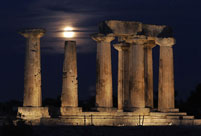For the past six months, Zhou Xuezhong has been living in Bama County in south China's Guangxi Zhuang Autonomous Region, a place thousands of kilometers from his home in Beijing.
It's the second year that the retired senior citizen has chosen to live temporarily in this "longevity county," which boasts a high number of centenarians.
The 73-year-old Zhou, who has been struggling with asthma and coronary disease for years, said he believes the good environment in Bama can help him battle his diseases, and he plans to return to the county annually.
Located in northwestern Guangxi, Bama counts many long-living elderly among its population of 240,000.
Official statistics show that there are nearly 31 centenarians for every 100,000 people in Bama. In 2012, Bama reported 81 centenarians, giving it one of the highest rates of centenarians in the world.
The natural conditions in Bama are widely believed to have contributed to local people's good health. Scientific tests show that the amount of negative oxygen ion in the air in remote Bama is far above that of many other places in China, and many believe this leads residents to feel energetic and comfortable.
The stories of Bama's "living legends" have spread across the country and enticed an increasing number of people from other provinces hoping to find the elixir to an enviable long life.
Earlier this month, various media outlets in China reported that many longevity pilgrims "crawl like dogs" and even drink urine in Bama, believing such practices can help keep illness at bay.
As more newcomers swarm to the county, a health preservation industry has gradually sprung up in Bama, partly thanks to promotion by the local government and the inflow of capital. In recent years, its tourism industry has soared due to the promotion of health preservation.
"We are trying to make Bama an international resort for health and recreation," said Feng Haifeng, secretary of the county committee of the Communist Party of China in Bama.
In 2012, the county received more than 2 million domestic and foreign tourists, a year-on-year increase of 23.3 percent. The revenue it generated stood at around 2 billion yuan (about 327 million U.S. dollars), accounting for 48.6 percent of Bama's annual gross domestic product.
In the first five months of this year, Bama has already received over 1million visitors, generating more than 927 million yuan in tourism revenue.
The reputation of the remote county is so widespread that it has even attracted a number of people who travel from far away to live in Bama for an extended stay.
This group is nicknamed "houniaoren," or "migratory people," with lives like those of migratory birds -- flying south in winter and staying in Bama for several months.
Chen Jinchao, head of the Guangxi Bama Longevity Research Institute, said the number of migratory people flocking to Bama has been on the rise in recent years.
"Last year, around 10,000 such tourists spent their Spring Festival, or the Chinese New Year, in Bama," he said.
Government statistics show that in 2012 alone about 180,000 migratory people visited Bama.
Most of the migratory people go to Bama for health recovery or even medical treatment, as they believe living conditions there can facilitate recovery.
Zhu Zhijun, a migratory person himself, said there are thousands of people like him living in Bama, many of whom have been diagnosed with cancer or tumors.
While the incoming tourists have contributed to the growing tourism revenue, they have also raised concerns.
Although no scientific evidence has proven that the natural environment in Bama is effective in curing illness, the county's reputation for longevity has stirred blind faith among many who regard it as a place offering the recipe for long life.
"Some people believe that once they are in Bama, all manner of diseases will be miraculously cured, without taking any medication," Chen said.
For instance, some patients resort to eating the Huoma, a local vegetable believed to guarantee a long life, on a daily basis, just because they believe that the Huoma will "keep the doctors away."
Others are obsessed with Bama's water. They even name it "divine water," thinking that it has amazing medical effects, while in fact the unfiltered water could contain excessive bacteria and cause diarrhea, Chen said.
He added that some patients insist on swimming in the "divine water," which has led to several drowning cases and forced the local government to put up fences around rivers.
Chen said another consideration is the possibility of disease transmission if more patients come to Bama for medical treatment.
"Although the clean air and water could provide a good environment for the recovery of people with chronic diseases, it is not a hospital," Chen said.
He believes that people obsessed with Bama are following the crowd, and that they should have a better understanding of what health preservation is really about.
"What's really important is for people to build a healthy lifestyle and raise awareness about exercise, rather than blindly searching for a long-life recipe in a longevity county," Chen said.
 Weekly selection of world photos (Aug.19-Aug.24)
Weekly selection of world photos (Aug.19-Aug.24) Army aviation brigade in actual-troop drill
Army aviation brigade in actual-troop drill Top 10 Chinese provinces for the well-heeled
Top 10 Chinese provinces for the well-heeled  Fan Bingbing poses for Malaysian magazine Citta Bella
Fan Bingbing poses for Malaysian magazine Citta Bella Wild dream: Hell-like training for bodyguard
Wild dream: Hell-like training for bodyguard  Zhang Xinyi covers COSMOPOLITAN
Zhang Xinyi covers COSMOPOLITAN The story of a savior sibling
The story of a savior sibling China’s weekly story
China’s weekly story  A collection of bizarre rooftop buildings around China
A collection of bizarre rooftop buildings around China 100th birthday of 'Little Mermaid'
100th birthday of 'Little Mermaid' China, U.S. conduct joint anti-piracy drill
China, U.S. conduct joint anti-piracy drill  Adorable! Marmots get along well with herdsmen
Adorable! Marmots get along well with herdsmen 2013 Taiwan Int'l Tourism Expo kicks off in Taipei
2013 Taiwan Int'l Tourism Expo kicks off in Taipei Photo story: Take a gap year
Photo story: Take a gap year Nokia's Global Headquarters: visiting a declining empire
Nokia's Global Headquarters: visiting a declining empireDay|Week|Month